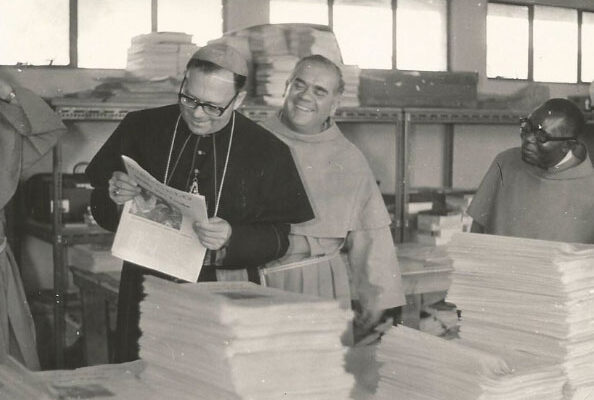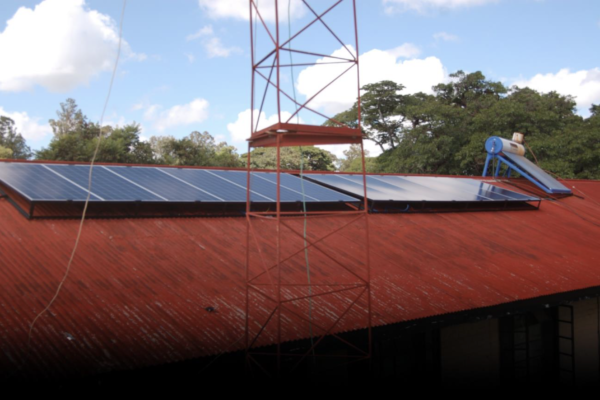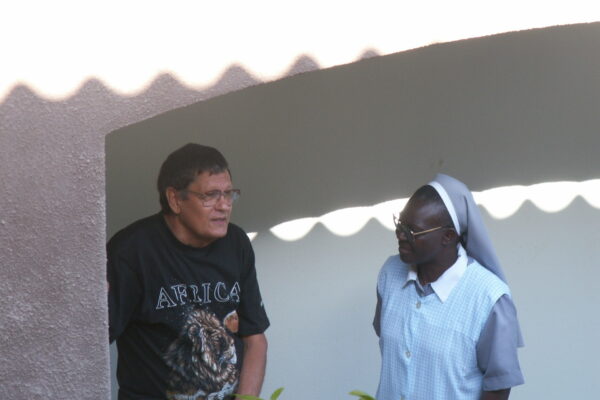Brother Tony ‘s Story
In 1965, Brother Tony Droll, OFM Conv. was living in Chaska, Minnesota, caring for 35 dairy cows at the Assumption Seminary Farm. But if he was going to fulfill a dream, his challenge was to sell the cows, then get clearance to go to Africa as a missionary.
The dream quickly became reality, and Br. Tony moved to what was then known as Northern Rhodesia, and is today called Zambia,
beginning a career of ministry that would span over 54 years.
He developed a habit of writing letters, including observations of interesting detail that made the area come to life. When he first arrived, the letters were filled with descriptions of travel: roads of sand, dirt, even a cowpath! There were some paved roads but only in more populated areas.
Br. Tony headed north and west from the settled area, into an area often called ‘the Bush.’ Each day traveling in the Bush is a long difficult journey over rough roads, over relatively few miles. Needless to say, such travel can be very hard on a vehicle, and shocks and springs can break, or lug nuts fall off causing the loss
of a wheel. These were the roads of the 1960s.
All the while Br. Tony, ever observant, saw the poverty of the people. In letters he noted that the people were joyful, ever friendly and polite in their poverty. A woman could carry a baby on her back while balancing a heavy load on her head. Even though thin and apparently malnourished, people had the strength and determination to walk for miles. Children were unspoiled and polite, and curious. Even as he learned new languages, Br. Tony found a way of communicating: a language of the heart.
He wrote that he kept in mind the reason he is there: “for their education, betterment of conditions, and sharing of the knowledge of Jesus Christ.” A simple meditation is his reflection on his first Christmas in Africa, a setting with no decorations, lights, or ornaments…only the poor Jesus, born, among the poor!
His descriptions go on and on, from building the church at Our Lady of Consolation Mission, to the use of radio for communication, to the changing and challenges of each season, and many others. I invite you to read more about this wonder-filled story of God’s Providence, the graces and gifts of the Holy Spirit that led the Friars in their work. Br. Tony was just one of these Friars, but his stories include many others who dedicated their lives to the Franciscan work of building the Church.

Zambian Mission Press
HISTORY
The Conventual Franciscan Friars of the Province of Our Lady of Consolation have had a presence in Zambia, a Central-African Nation, since the early 1950s. Since the arrival of Friar Tony Droll in 1965, the mission has grown to include a Seminary, a convent, health clinic, church, parochial schools, and the flagship program “Mission Press,” whose goal is “evangelization through publications.”
The Mission Press is the primary source of income for the Zambian friars. Profits are used to support each of the other missions serving the poorest of the poor in Zambia. The Mission Press has been publishing magazines, journals, and religious-minded works since the 1970s, even though political turmoil, drought, harassment, and economic challenges. The University of Zambia writes, “The study further shows that Mission Press faced opposition from successive Zambian government as a result of its publications in the Second and Third Republics. The editors were intimidated, threatened, and sometimes manhandled. In its fight for justice, Mission Press defended the rights of the poor and the vulnerable in society. Political prisoners were released, vulnerable settlers were not evicted from their settlements, and the conditions of service for workers were improved. Lastly, this work argues that the Press played a valuable role in the transition from the one-party political system to multi-party democracy in Zambia.”
Sadly, Central Africa is currently in an Energy Crisis not seen before. Energy prices in Zambia have increased over 113%, while rolling blackouts and mandatory shutoffs are for 15 hours a day or more (Reuters December 2020). With this crisis in place, the Mission Press struggles to provide the written evangelization needed to help the Catholic Community in Central Africa. It is becoming harder to provide literature because a shorter amount of time power is available and the high production cost.
YOU CAN HELP
The Franciscan Friars and their friends want to provide a Solar Array to the Mission Press! We are excited to announce an American foundation has agreed to match our donations for this initiative should we reach a $38,000 goal. Solar arrays would provide the Mission Press a stable, cost-effective power source to continue their great works. Please consider a donation to the Zambian Conventual Franciscan Friars today!
Left: Our Zambian Brothers Celebrating in Song
Middle : Conventual Friars Bishop John Stowe, Bishop Patrick Chisanga, and Br. Tony Droll pose for a picture at the Congo border.
Right: Students at the St. Francis Technical school are already seeing benefits of our solar efforts with reliable energy.
Zambian Mission Press
The Conventual Franciscan Friars of the Province of Our Lady of Consolation have had a presence in Zambia, a Central-African Nation, since the early 1950s. Since the arrival of Friar Tony Droll in 1965, the mission has grown to include a Seminary, a convent, health clinic, church, parochial schools, and the flagship program “Mission Press,” whose goal is “evangelization through publications.”
Zambian Mission Press
HISTORY
The Conventual Franciscan Friars of the Province of Our Lady of Consolation have had a presence in Zambia, a Central-African Nation, since the early 1950s. Since the arrival of Friar Tony Droll in 1965, the mission has grown to include a Seminary, a convent, health clinic, church, parochial schools, and the flagship program “Mission Press,” whose goal is “evangelization through publications.”
The Mission Press is the primary source of income for the Zambian friars. Profits are used to support each of the other missions serving the poorest of the poor in Zambia. The Mission Press has been publishing magazines, journals, and religious-minded works since the 1970s, even though political turmoil, drought, harassment, and economic challenges. The University of Zambia writes, “The study further shows that Mission Press faced opposition from successive Zambian government as a result of its publications in the Second and Third Republics. The editors were intimidated, threatened, and sometimes manhandled. In its fight for justice, Mission Press defended the rights of the poor and the vulnerable in society. Political prisoners were released, vulnerable settlers were not evicted from their settlements, and the conditions of service for workers were improved. Lastly, this work argues that the Press played a valuable role in the transition from the one-party political system to multi-party democracy in Zambia.”
Sadly, Central Africa is currently in an Energy Crisis not seen before. Energy prices in Zambia have increased over 113%, while rolling blackouts and mandatory shutoffs are for 15 hours a day or more (Reuters December 2020). With this crisis in place, the Mission Press struggles to provide the written evangelization needed to help the Catholic Community in Central Africa. It is becoming harder to provide literature because a shorter amount of time power is available and the high production cost.
YOU CAN HELP
The Franciscan Friars and their friends want to provide a Solar Array to the Mission Press! We are excited to announce an American foundation has agreed to match our donations for this initiative should we reach a $38,000 goal. Solar arrays would provide the Mission Press a stable, cost-effective power source to continue their great works. Please consider a donation to the Zambian Conventual Franciscan Friars today!
Left: Our Zambian Brothers Celebrating in Song
Middle : Conventual Friars Bishop John Stowe, Bishop Patrick Chisanga, and Br. Tony Droll pose for a picture at the Congo border.
Right: Students at the St. Francis Technical school are already seeing benefits of our solar efforts with reliable energy.

St. Francis Friary Solar Project
A True Ecological Gift!
by Friar Katongo L. Chilambwe OFM Conv.
St. Francis Friary in Zambia has been blessed with an invaluable Franciscan gift. Recently, the mission, through Our Lady of Consolation Province, received a generous donation with funds raised by Dr. Robert Barnet and his wife, Dr. Carol Taylor, for the purchase and installment of a solar kit comprising of 36 solar panels, six inverters, and eight lithium batteries.
This gift comes at a time when Zambia is facing an unprecedented energy crisis as a result of decreased water levels at the central hydropower station at the Kariba dam, thus drastically affecting electricity generation. Zambia experienced the full impact of climate change in the form of drought in the 2018-2019 rainy season in most parts of the country, especially the southern region.
Due to overreliance on hydropower, the poor rains caused Zambia to incur an energy deficit of nearly 80% of electricity generation. As a result, the main power utility company has introduced rolling blackouts for long as 18 hours per day. However, in mitigating this energy crisis, the government is investing in several additional solar, hydro, and thermal power, which may be a long time coming.
St. Francis Friary has been adversely affected by constant and prolonged power cuts. Six hours of electricity per day, often in the middle of the night, left Zambia crippled. The mission has struggled to irrigate its vegetable gardens, water the lawn, and operate communication devices, among other activities. Not anymore!
St. Francis Friary Solar Project
St. Francis Friary in Zambia has been blessed with an invaluable Franciscan gift. Recently, the mission, through Our Lady of Consolation Province, received a generous donation with funds raised by Dr. Robert Barnet and his wife, Dr. Carol Taylor, for the purchase and installment of a solar kit comprising of 36 solar panels, six inverters, and eight lithium batteries.
St. Francis Friary Solar Project
A True Ecological Gift!
by Friar Katongo L. Chilambwe OFM Conv.
St. Francis Friary in Zambia has been blessed with an invaluable Franciscan gift. Recently, the mission, through Our Lady of Consolation Province, received a generous donation with funds raised by Dr. Robert Barnet and his wife, Dr. Carol Taylor, for the purchase and installment of a solar kit comprising of 36 solar panels, six inverters, and eight lithium batteries.
This gift comes at a time when Zambia is facing an unprecedented energy crisis as a result of decreased water levels at the central hydropower station at the Kariba dam, thus drastically affecting electricity generation. Zambia experienced the full impact of climate change in the form of drought in the 2018-2019 rainy season in most parts of the country, especially the southern region.
Due to overreliance on hydropower, the poor rains caused Zambia to incur an energy deficit of nearly 80% of electricity generation. As a result, the main power utility company has introduced rolling blackouts for long as 18 hours per day. However, in mitigating this energy crisis, the government is investing in several additional solar, hydro, and thermal power, which may be a long time coming.
St. Francis Friary has been adversely affected by constant and prolonged power cuts. Six hours of electricity per day, often in the middle of the night, left Zambia crippled. The mission has struggled to irrigate its vegetable gardens, water the lawn, and operate communication devices, among other activities. Not anymore!

Listen to Him
A reflection by Brother Tony Droll, OFM Conv
It was spring of 1965. A young enthusiastic Franciscan set foot on the newly independent African country. He came to teach, to help, to work, to experience adventure. Challenge was his companion as he began to teach. Eagerness his companion as he set out to help the people have a better house. A better life. Determination his companion as he taught them agriculture, raising animals and fish. Service was his garment as he taught in the Seminary. Compassion drove him as he ministered to the refugees.
The people happily listened to him. He gave, they received. He talked, they listened. But did he know the people’s hearts? Their problems? Their dreams?
It took time for him to realize that he would only learn to know and love them when he would listen, to their words. To their actions. To the way they relate to one another. To a joy they have even in poverty. To how they mourn their deceased. To their prayer. To how they sing. How they dance for the Lord.
And now, 56 years later, he has learned more how to listen to the Zambian people. To learn from them. Not just with the ears but with the heart.
The art of listening becomes the art of respect: Of their natural wisdom. Of their culture. Traditions. Virtues. Their love. Inviting it to touch my life. I have learned more from them than what they have learned from me.
“Listen to Him” becomes ‘Respect Him’. Respect His Gospel. Live His Gospel. Act on His Gospel. Let our lives pass on that respect to others. And He who respects you will listen to you and love you.
How easy in this modern world to allow these values to begin to fade. The time of Lent is a gift from the Church. A time to allow us to retreat from the distractions that society and life’s circumstances can lead us away. For me it is a time to reflect on past years of relationship when my African friends taught me how to “Listen to Him.”
Listen to Him
A reflection by Brother Tony Droll, OFM Conv
It was spring of 1965. A young enthusiastic Franciscan set foot on the newly independent African country. He came to teach, to help, to work, to experience adventure. Challenge was his companion as he began to teach. Eagerness his companion as he set out to help the people have a better house. A better life. Determination his companion as he taught them agriculture, raising animals and fish. Service was his garment as he taught in the Seminary. Compassion drove him as he ministered to the refugees.
Listen to Him
A reflection by Brother Tony Droll, OFM Conv
It was spring of 1965. A young enthusiastic Franciscan set foot on the newly independent African country. He came to teach, to help, to work, to experience adventure. Challenge was his companion as he began to teach. Eagerness his companion as he set out to help the people have a better house. A better life. Determination his companion as he taught them agriculture, raising animals and fish. Service was his garment as he taught in the Seminary. Compassion drove him as he ministered to the refugees.
The people happily listened to him. He gave, they received. He talked, they listened. But did he know the people’s hearts? Their problems? Their dreams?
It took time for him to realize that he would only learn to know and love them when he would listen, to their words. To their actions. To the way they relate to one another. To a joy they have even in poverty. To how they mourn their deceased. To their prayer. To how they sing. How they dance for the Lord.
And now, 56 years later, he has learned more how to listen to the Zambian people. To learn from them. Not just with the ears but with the heart.
The art of listening becomes the art of respect: Of their natural wisdom. Of their culture. Traditions. Virtues. Their love. Inviting it to touch my life. I have learned more from them than what they have learned from me.
“Listen to Him” becomes ‘Respect Him’. Respect His Gospel. Live His Gospel. Act on His Gospel. Let our lives pass on that respect to others. And He who respects you will listen to you and love you.
How easy in this modern world to allow these values to begin to fade. The time of Lent is a gift from the Church. A time to allow us to retreat from the distractions that society and life’s circumstances can lead us away. For me it is a time to reflect on past years of relationship when my African friends taught me how to “Listen to Him.”


